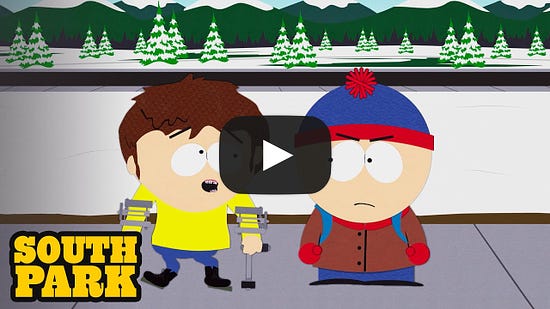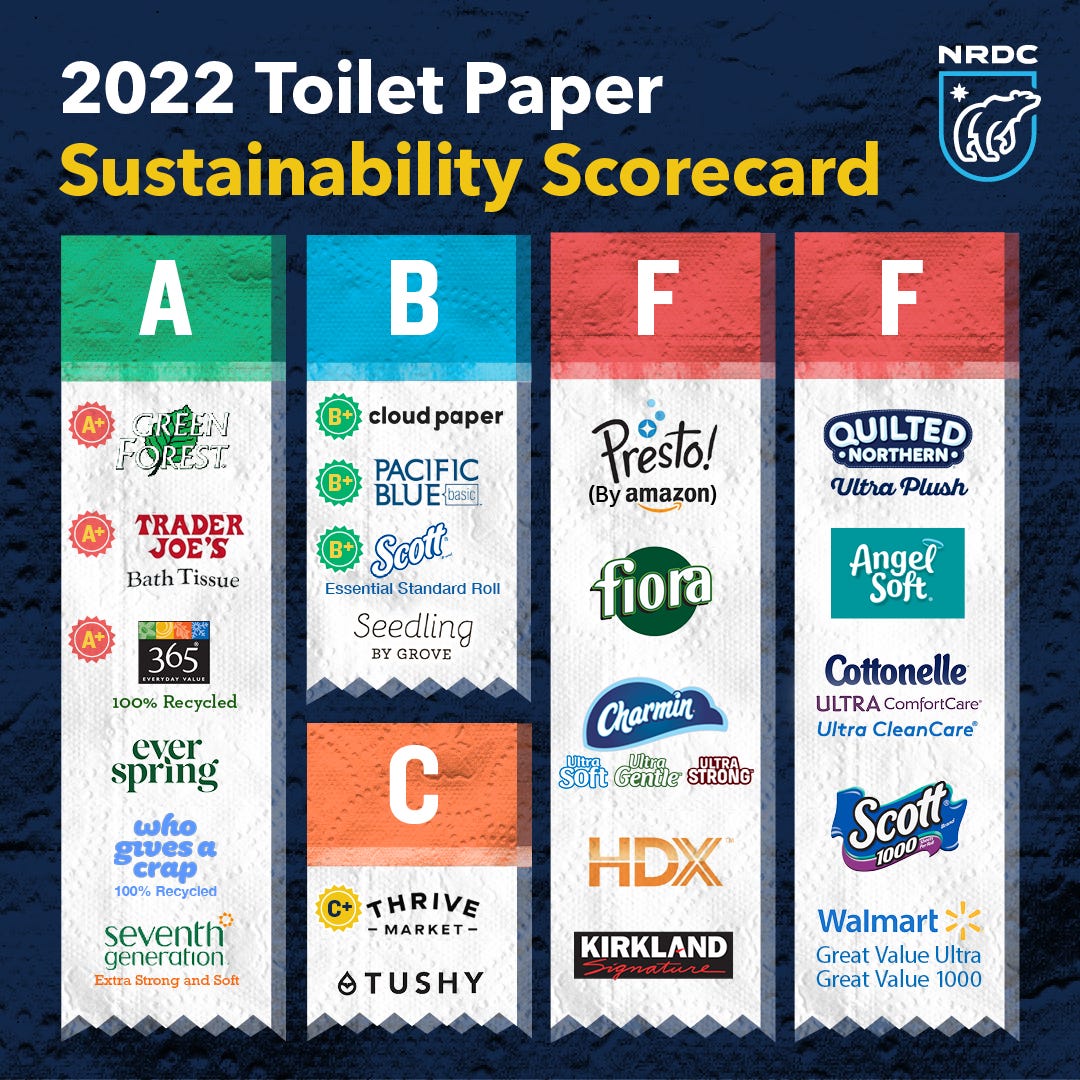HEATED - The truth about Big Toilet Paper
Hello and happy Friday! We’ve been sending you a lot of heavy stuff lately, so today we’re sending out a bonus newsletter with something a little lighter. Consider it a token of gratitude for your time, attention, and readership. Hope you enjoy. And if you do, what are you waiting for? Join our paid subscriber community already, would ya?? The truth about Big Toilet PaperAre the fat cats at Charmin waging a secret campaign to prevent the widespread adoption of bidets?Earlier this month, a Peabody Award-winning television show with millions of weekly viewers used its platform to expose an oft-overlooked industry driving the climate crisis. The show was South Park. The industry was toilet paper. 
In an episode called “Japanese Toilets,” disabled eighth-grader Jimmy pulls his classmate Stan aside to warn him about the devastation wrought by industrial logging for toilet paper. Jimmy’s warning came because Stan’s dad, Randy, had just bought a Japanese toilet with a built-in bidet, and was going around town evangelizing about the superiority of bidets to toilet paper. Jimmy told Stan that if Randy didn’t shut up, the high-polluting, high-profit toilet paper industry would take him down. After all, Jimmy said, there’s a reason most Americans still prefer toilet paper to bidets, despite the fact that toilet paper destroys the environment and doesn’t even clean your butt very well. “They don’t want Japanese toilets in America,” Jimmy said. “And they have the power to stop them.” Jimmy’s last statement was meant to sound ridiculous. But we know that Big Oil led a decades-long campaign to downplay climate science in order to keep profiting from fossil fuels. Is it really that implausible to think Big Toilet Paper might be doing something similar? So for today’s newsletter, we decided to take a deeper look at “Japanese Toilets” and its claims, to try and separate fact from fiction. Are old-growth, climate-protector forests really being razed for your extra-plush Charmin? And are the fat cats at Big Toilet Paper really waging a secret campaign to prevent the widespread adoption of bidets? The truth about Big Toilet PaperHold onto your butts: South Park’s “Japanese Toilet” episode actually hit on a pretty big climate issue. Toilet paper may seem like a small necessity, but it's part of a pulp and paper industry that logs the last intact forests in the world. Those forests are critical to slowing down global warming because they remove up to 30 percent of human carbon dioxide emissions from the atmosphere during photosynthesis. The National Resources Defense Council (NRDC) has called the toilet paper industry “among the most egregious climate offenders in Canada,” where more of the industry’s deforestation occurs.
The 140-rolls-per American figure comes from the NRDC, so it could be true. However, 140 rolls per person seems too high to us, unless you’re someone who goes through two rolls of toilet paper a week.
To meet our demand for toilet paper, large swaths of forest are logged and turned into wood pulp, which is then processed and bleached. About one-third of the pulp used to make American tissue products comes from an evergreen, almost pristine 1.3 billion acres of wilderness in Canada known as the boreal forest, according to NRDC. The 31.1 million tree figure comes from a study done by U.K. bathroom supplier QS Supplies. We also couldn’t independently verify how many trees go into a roll of toilet paper, because that’s not how logging is measured (the same logged area makes multiple paper or tissue products). But more than 1 million acres of Canadian boreal forest are logged every year, releasing more than 25 million metric tons of carbon dioxide into the atmosphere, according to the NRDC. That’s the equivalent of the emissions from 5.3 million vehicles, and more than the emissions from countries like Estonia or Latvia. This deforestation also means cutting down one of the largest terrestrial carbon sinks in the world, alongside the Amazon and the peatlands of Indonesia and Central Africa. Canada’s boreal forest is one of the largest intact forest ecosystems left on the planet, and it stores an estimated 306 billion metric tons of carbon. Cutting down old-growth forests releases carbon dioxide that has taken centuries to accumulate. “Areas that have never before been logged and are immensely carbon rich are being cut down so they can be turned into products that are used once and then flushed away forever,” said Ashley Jordan, author of the NRDC’s “The Issue With Tissue” report.
The U.S. market for toilet paper was worth an estimated $12.5 billion last year–but the companies that sell toilet paper have much deeper pockets than that. Proctor & Gamble, Kimberly-Clark, Georgia-Pacific, and Unilever make most of the recognizable brands you see in the grocery store: Charmin, Cottonelle, Quilted Northern, and Seventh Generation. Those companies are valued in the tens of billions. The real reason toilet paper reigns in AmericaWhile the toilet paper industry’s marketing is certainly prolific and effective, industry meddling doesn’t seem to be the reason Americans haven’t taken to bidets. The reason seems to boil down to a combination of sexism, hatred of the French, and Americans generally being afraid of their own butts. Let’s take them one by one.
TP is a climate issue where consumer choice actually mattersIn addition to hitting on a real climate issue, South Park hit on a climate issue where individuals can be a powerful force for change. “Consumers have never had this much access to sustainable tissue brands before,” said Jordan. “Making the switch is so simple but will save essentially a priceless cost for the planet and the global climate.” If you’re attached to toilet paper, there are lots of brands that are made from recycled pulp. NRDC made a handy toilet paper guide for which brands are sustainable. If you’re ready to make the switch to bidets, there’s a whole wonderful world with a range of budgets. Tushy, started by the founder of Thinx period underwear, sells bidet attachments for $69. Heated bidet seats can cost anywhere from $200 to $500. A Japanese smart toilet, which will wash and dry you! can cost you upwards of $2,000—plus plumbing costs. (Here’s a list of recommendations for bidets.) You don’t have to stop at individual choice, either. The toilet paper problem also presents an opportunity to advocate for corporate change. Some companies, like Kimberly-Clark and Unilever, have promised to reduce their impact on forests by making 100 percent recycled toilet paper. But not Proctor & Gamble, which relies on the Canadian boreal forest to produce the most popular toilet paper in America: Charmin. In 2021, more than 100 environmental groups sent a letter to P&G shareholders, asking them to minimize their impacts on the boreal and tropical forests. A year later, P&G promised to stop buying pulp from certain Canadian forests, but there’s been no evidence they’ve followed through. P&G is reluctant to make the change because virgin pulp, aka wood that has never been used before, makes the softest tissue paper. And since P&G holds 25 percent of the North American toilet paper market share with their ever-so-soft Charmin, you can see why they don’t want to switch to recycled tissue. The world is in your hands—or at least, your tuchus. Catch of the day: Here are some incredibly welcome fat cats (look at their little cheeks!) Please consider Fenix, Portos, Armistead, and Zorro for your next house party. Reader Vlada promises they’re very sweet and definitely not staring into a fearful future. Want to see your furry (or non-furry!) friend in HEATED? Send a picture and some words to catchoftheday@heated.world. You're currently a free subscriber to HEATED. For the full experience, upgrade your subscription. |
Older messages
Willow is not just an “environmentalist” concern
Thursday, March 16, 2023
HEATED analyzed 30 national news stories about the Willow project and found that 75 percent framed its importance as primarily political.
The hidden toll of climate disasters
Thursday, March 9, 2023
Most climate-related mental health challenges don't come from “doom-and-gloom” rhetoric. They come from climate change itself.
Growing our climate choir
Tuesday, March 7, 2023
Thanks to your support, HEATED is expanding its reach to nearly a half million climate-concerned people on Instagram.
The world promised to phase out fossil fuel subsidies. Instead, it doubled them.
Thursday, March 2, 2023
The sharp rise in fossil fuel subsidies is just one example of why activists say climate treaties are so often meaningless.
Do fossil fuels have a place in the net zero transition?
Thursday, February 23, 2023
In our first edition of Wormhole, Arielle dives into a question that kept coming up in our previous story.
You Might Also Like
What if 2025 was your best year yet?
Sunday, January 12, 2025
Or how I am trying to invite just a little more optimism into my life ͏ ͏ ͏ ͏ ͏ ͏ ͏ ͏ ͏ ͏ ͏ ͏ ͏ ͏ ͏ ͏ ͏ ͏ ͏ ͏ ͏ ͏ ͏ ͏ ͏ ͏ ͏ ͏ ͏ ͏ ͏ ͏ ͏ ͏ ͏ ͏ ͏ ͏ ͏ ͏ ͏ ͏ ͏ ͏ ͏ ͏ ͏ ͏ ͏ ͏ ͏ ͏ ͏ ͏ ͏ ͏ ͏ ͏ ͏ ͏ ͏ ͏ ͏ ͏ ͏ ͏
This Iconic Early 2000s Jewelry Trend Is Making A Comeback
Sunday, January 12, 2025
Go bold. The Zoe Report Daily The Zoe Report 1.11.2025 This Iconic Early 2000s Jewelry Trend Is Making A Comeback (Shopping) This Iconic Early 2000s Jewelry Trend Is Making A Comeback Go bold. Read
Looking for Better Sleep in 2025? Our Favorite Mattresses Are $300 Off Right Now
Saturday, January 11, 2025
If you have trouble reading this message, view it in a browser. Men's Health The Check Out Welcome to The Check Out, our newsletter that gives you a deeper look at some of our editors' favorite
You're Probably Checking Your 401(k) Too Often
Saturday, January 11, 2025
Think of New Habits As Skills. Staring at the number won't make it go up. Not displaying correctly? View this newsletter online. TODAY'S FEATURED STORY You're Probably Checking Your 401(k)
Love, Safety, and Connection in Times of Climate Distress
Saturday, January 11, 2025
Free Meditation ͏ ͏ ͏ ͏ ͏ ͏ ͏ ͏ ͏ ͏ ͏ ͏ ͏ ͏ ͏ ͏ ͏ ͏ ͏ ͏ ͏ ͏ ͏ ͏ ͏ ͏ ͏ ͏ ͏ ͏ ͏ ͏ ͏ ͏ ͏ ͏ ͏ ͏ ͏ ͏ ͏ ͏ ͏ ͏ ͏ ͏ ͏ ͏ ͏ ͏ ͏ ͏ ͏ ͏ ͏ ͏ ͏ ͏ ͏ ͏ ͏ ͏ ͏ ͏ ͏ ͏ ͏ ͏ ͏ ͏ ͏ ͏ ͏ ͏ ͏ ͏ ͏ ͏ ͏ ͏ ͏ ͏ ͏ ͏ ͏ ͏ ͏ ͏ ͏ ͏ ͏ ͏ ͏
Weekend: How to Tell Guests to Get a Hotel 🏨
Saturday, January 11, 2025
— Check out what we Skimm'd for you today January 11, 2025 Subscribe Read in browser Header Image But First: a hydrating, tinted lip treatment we love Update location or View forecast EDITOR'S
Dandori Time!
Saturday, January 11, 2025
Lessons from a video game ͏ ͏ ͏ ͏ ͏ ͏ ͏ ͏ ͏ ͏ ͏ ͏ ͏ ͏ ͏ ͏ ͏ ͏ ͏ ͏ ͏ ͏ ͏ ͏ ͏ ͏ ͏ ͏ ͏ ͏ ͏ ͏ ͏ ͏ ͏ ͏ ͏ ͏ ͏ ͏ ͏ ͏ ͏ ͏ ͏ ͏ ͏ ͏ ͏ ͏ ͏ ͏ ͏ ͏ ͏ ͏ ͏ ͏ ͏ ͏ ͏ ͏ ͏ ͏ ͏ ͏ ͏ ͏ ͏ ͏ ͏ ͏ ͏ ͏ ͏ ͏ ͏ ͏ ͏ ͏ ͏ ͏ ͏ ͏ ͏ ͏ ͏ ͏
“Winter Night” by Amos Wilder
Saturday, January 11, 2025
O magical the winter night! Illusory this stretch / Of unimaginable grays January 11, 2025 donate Winter Night Amos Wilder O magical the winter night! Illusory this stretch Of unimaginable grays; so
Anne Hathaway Just Shut It Down In A Princess-Like Oscar de la Renta Gown
Saturday, January 11, 2025
She's sure to start a trend. The Zoe Report Daily The Zoe Report 1.10.2025 Anne Hathaway Just Shut It Down In A Princess-Like Oscar de la Renta Gown (Celebrity) Anne Hathaway Just Shut It Down In A
The Difference Between Cleaning, Disinfecting, and Sanitizing
Friday, January 10, 2025
The Best Products We Saw at CES 2025 Cleaning doesn't necessarily sanitize, and sanitizing doesn't necessarily disinfect. Here's the difference and when you need each. Not displaying



